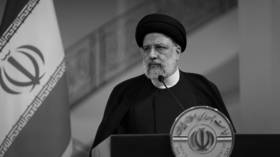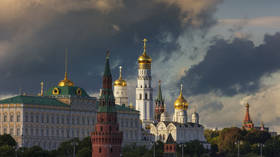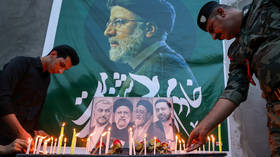‘National tragedy’: RT reports from Iran after death of its president
RT correspondent Abbas Juma, who was in Iran on assignment when President Raisi’s helicopter crashed, describes the disbelief that enveloped the nation when the news broke
Throughout the night of May 19-20, Iranian rescue teams searched through dense fog for the wreckage of the helicopter carrying the president and the foreign minister. The search was hindered by the weather conditions and terrain, with the rain-soaked ground impeding both personnel and equipment. Meanwhile, Iranians across the country prayed, wept, and anxiously awaited news.
Hope and loss
During the night, prominent and reputable regional and global media outlets, in a frenzy for sensational updates, disseminated inaccurate information about the search efforts. Some later hurriedly removed these reports. Social media was flooded with hastily fabricated falsehoods, fueled by opponents of the Iranian government. According to one widely spread rumor, mass celebrations erupted in Tehran, with claims that people were rejoicing over the president’s death and launching fireworks.
Refuting these blatant lies was not difficult, as I spent the night on Valiasr Street, one of Tehran’s main thoroughfares. Loudspeakers broadcasting prayers were promptly set up in the square, and journalists actively gathered the views of residents who had come out to support the president.
“We decided as a family to ignore social media and television. They always mix things up; you can’t get the truth. It’s better to pray and wait for official statements,” Mustafa, one of the people on the street, said.
“We are very concerned and distressed. We pray to God for his safe return. We ask Allah and Imam Mahdi to bring him back to us unharmed,” a young woman struggling to hold back tears said. “He is our father, the support of the Islamic Ummah, and a companion of the Supreme Leader.”
Sadly, the people of Iran did not see their president return. The nation declared a period of mourning, and the deceased were honored in Tabriz, Qom, and Tehran. Ebrahim Raisi’s funeral will be held on Thursday in Mashhad, his hometown.
Cold Calm
There is no panic in Iran, only pain. On the morning of May 20, the Islamic Republic donned black for five days of mourning. People, especially women, went to work with faces swollen from the night’s tears. The religious Iranians in the holy city of Qom, whom I spoke with, believe that everything is in the hands of the Almighty. They prepare themselves for death daily, thus experiencing neither panic nor surprise.
Part of my personal agenda in Tehran was canceled, including several meetings and interviews. However, there has been no political or public apathy. Notably, there have been no internet issues in the country as of the time of writing.
People are awaiting the results of the investigation into the crash, while the authorities decide on the next steps. The main theories are either weather-related or sabotage. If nature is not to blame, the primary suspicion in Iranian society falls on Israel.
Local analysts suggest the scale of the incident could lead to various consequences. If Israel is found to be involved, the situation could become a ‘black swan’ event, pushing the world once again to the brink of a major conflict.
Future of the system
The president’s death is a national tragedy. However, unlike most countries, Iran has a supreme leader who directs the state and is deeply involved in its details. The system will not collapse as it is designed to be resilient, with no indispensable figures. All state personnel are trained accordingly. This is why the death of the legendary General Qassem Soleimani in a US attack in 2020 did not destabilize the national security apparatus or weaken the Islamic Revolutionary Guard Corps (IRGC). Another general (less famous in the media but equally experienced and effective), immediately stepped in. Iran’s talent pool is enviable.
According to the constitution, the acting president will be the first vice president, Mohammad Mokhber. Elections are scheduled for June 28. Rumors are circulating that pro-Western politicians, who lost to Raisi and the conservatives a few years ago, might have a real chance to return to the political arena. However, in the 2021 presidential election, it was not just Raisi who won, but the political course and ideology he represented, reflecting the conservative segment of society. These are the people who filled the cities where farewells to the president and his team took place.
Reformists have turned from national leaders to marginalized figures over the years. They failed spectacularly in parliament and then lost to Raisi in the elections. The Iranian people were disappointed in their ideas; they are considered morally and politically bankrupt and will also face resistance from the security forces and the clergy.
A man who cared
Raisi, the eighth president of Iran, and his term in office were mysteriously connected to the eighth Shiite Imam Ali al-Rida. The date Raisi took office and the date of his death coincided with the day the Islamic Republic honors this holy figure. Many religious Iranians attribute special significance to this symbolism.
“From the very beginning of our acquaintance, long before he became president, I noted his main trait – he was a man of his word. He had no ambitions; he was not involved in worldly affairs, only in serving God. I remember thinking that I had known him all my life, though we had only recently met,” Ali Akbar, the director of the International Office of the Supreme Leader for US and EU Affairs, said.
“It was very easy to work with Raisi because we always knew that if we agreed on something, it would happen. We didn’t have to expect unpredictable or inappropriate actions from him. He was always sincere and straightforward. Once, long ago, when Raisi seemed to be the deputy head of the judiciary, I approached him for help. We had an organization facing financial problems that affected thousands of people. He saw me for the first time, listened attentively, and solved the problem. Yes, it took some time, a couple of years, but the problem was resolved. Someone of his stature could have easily ignored us. That’s how he led the country.”
What’s next?
In this context, it’s impossible not to recall the recent attempted coup in Turkey and the assassination attempt on the Slovak prime minister. There were also unconfirmed reports of an attempt on the Saudi crown prince. You don’t need to be a conspiracy theorist to believe that this is no coincidence.
It’s clear that the helicopter crash incident will be actively exploited by Iran’s adversaries both domestically and abroad, especially during this politically vulnerable period leading up to the elections. The media has already started pushing the unsubstantiated narrative that Raisi’s helicopter crash was the result of an internal power struggle. There are also rumors of internal opponents to Iran-Azerbaijan cooperation.
It’s evident that the situation will be destabilized until a new leader is in place, from whom much will depend.
In the long term, Iran will be fine. Supreme Leader Ayatollah Seyed Ali Khamenei recently assured this. Ali Akbar, who knew the president personally, reminds us that in 1981, a terrorist attack killed dozens of high-ranking members of the Islamic Republican Party, including its head, Mohammad Beheshti. The country survived thanks to its robust personnel system. It will be the same this time.
For now, the world waits for the investigation results and the upcoming presidential election.








Comments are closed.